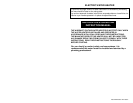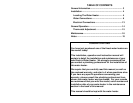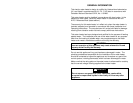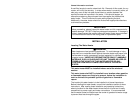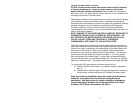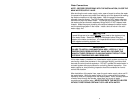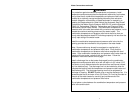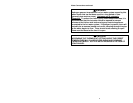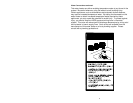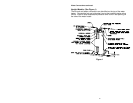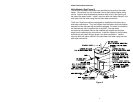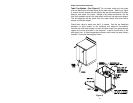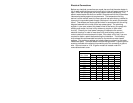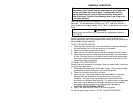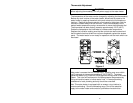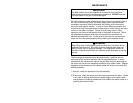
6
Water Connections
NOTE: BEFORE PROCEEDING WITH THE INSTALLATION, CLOSE THE
MAIN WATER SUPPLY VALVE.
After shutting the main water supply valve, open a faucet to relieve the water
line pressure to prevent any water from leaking out of the pipes while making
the water connections to the water heater. After the pressure has been
relieved, close the faucet. The COLD water inlet and HOT water outlet are
identified on top of the water heater. The fittings at the cold water inlet and
hot water outlet are dielectric waterway fittings with 3/4” NPT tapered male
threads. Make the proper plumbing connections between the water heater
and the plumbing system in the house. Install a shut-off valve in the cold
water supply line.
If this water heater is installed in a closed water supply system, such as the
one having a back-flow preventer in the cold water supply, provisions shall
be made to control thermal expansion. DO NOT operate this water heater in
a closed system without provisions for controlling thermal expansion. Your
water supplier or local plumbing inspector should be contacted on how to
control this situation.
After installation of the water lines, open the main water supply valve and fill
the water heater. While the water heater is filling, open several hot water
faucets to allow air to escape from the water system. When a steady stream
of water flows through the faucets, close them and check all water
connections for possible leaks. NEVER OPERATE THE WATER HEATER
WITHOUT FIRST BEING CERTAIN IT IS FILLED WITH WATER.
CAUTION
If sweat fittings are to be used, DO NOT apply heat to the nipples on top
of the water heater. Sweat the tubing to the adapter before fitting the
adapter to the water connections. It is imperative that heat is not applied
to the nipples containing a plastic liner.
IMPORTANT
FAILURE TO INSTALL AND MAINTAIN A NEW, LISTED 3/4” X 3/4”
TEMPERATURE-PRESSURE RELIEF VALVE WILL RELEASE THE
MANUFACTURER FROM ANY CLAIM WHICH MIGHT RESULT FROM
EXCESSIVE TEMPERATURE AND PRESSURES.



